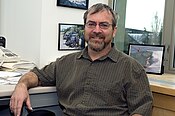
The enzyme phospholipase A2 (EC 3.1.1.4, PLA2, systematic name phosphatidylcholine 2-acylhydrolase) catalyses the cleavage of fatty acids in position 2 of phospholipids, hydrolyzing the bond between the second fatty acid “tail” and the glycerol molecule:
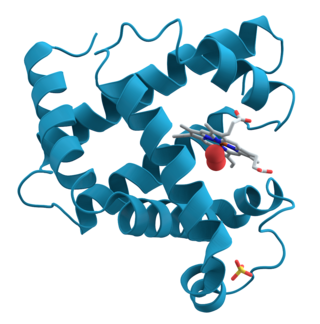
The following outline is provided as an overview of and topical guide to biochemistry:

Cathepsin S is a protein that in humans is encoded by the CTSS gene. Transcript variants utilizing alternative polyadenylation signals exist for this gene.

Rudolf Aebersold is a Swiss biologist, regarded as a pioneer in the fields of proteomics and systems biology. He has primarily researched techniques for measuring proteins in complex samples, in many cases via mass spectrometry. Ruedi Aebersold is a professor of Systems biology at the Institute of Molecular Systems Biology (IMSB) in ETH Zurich. He was one of the founders of the Institute for Systems Biology in Seattle, Washington, United States where he previously had a research group.
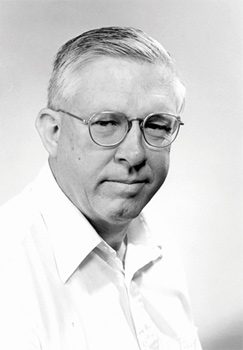
William Wallace Cleland (January 6, 1930 – March 6, 2013, often cited as W. W. Cleland, and known almost universally as "Mo Cleland", was a University of Wisconsin-Madison biochemistry professor. His research was concerned with enzyme reaction mechanism and enzyme kinetics, especially multiple-substrate enzymes. He was elected to the National Academy of Sciences in 1985.
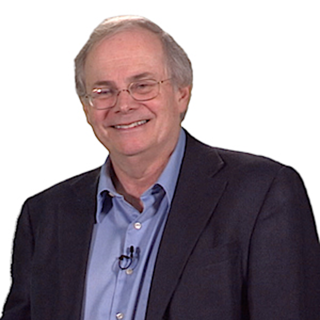
Gregory A. Petsko is an American biochemist and member of the National Academy of Sciences, the National Academy of Medicine, the American Academy of Arts and Sciences, and the American Philosophical Society. He is currently Professor of Neurology at the Ann Romney Center for Neurologic Diseases at Harvard Medical School and Brigham and Women's Hospital. He formerly had an endowed professorship in Neurology and Neuroscience at Weill Cornell Medical College and is still an adjunct professor of Biomedical Engineering at Cornell University, and is also the Gyula and Katica Tauber Professor, Emeritus, in biochemistry and chemistry at Brandeis University. On October 24, 2023, in a ceremony in the East Room of the White House, President Joe Biden presented Gregory Petsko and eight others with the National Medal of Science, the highest honor the United States can bestow on a scientist and engineer.

Tripeptidyl-peptidase 1, also known as Lysosomal pepstatin-insensitive protease, is an enzyme that in humans is encoded by the TPP1 gene. TPP1 should not be confused with the TPP1 shelterin protein which protects telomeres and is encoded by the ACD gene. Mutations in the TPP1 gene leads to late infantile neuronal ceroid lipofuscinosis.
Joseph Stewart Fruton, born Joseph Fruchtgarten, was a Polish-American biochemist and historian of science. His most significant scientific work involved synthetic peptides and their interactions with proteases; with his wife Sofia Simmonds he also published an influential textbook, General Biochemistry. From 1970 until his death, Fruton worked extensively on the history of science, particularly the history of biochemistry and molecular biology.

William Platt Jencks was an American biochemist. He was noted particularly for his work on enzymes, using concepts drawn from organic chemistry to understand their mechanisms.

Lipoprotein-associated phospholipase A2 (Lp-PLA2) also known as platelet-activating factor acetylhydrolase (PAF-AH) is a phospholipase A2 enzyme that in humans is encoded by the PLA2G7 gene. Lp-PLA2 is a 45-kDa protein of 441 amino acids. It is one of several PAF acetylhydrolases.
An isotope-coded affinity tag (ICAT) is an in-vitro isotopic labeling method used for quantitative proteomics by mass spectrometry that uses chemical labeling reagents. These chemical probes consist of three elements: a reactive group for labeling an amino acid side chain, an isotopically coded linker, and a tag for the affinity isolation of labeled proteins/peptides. The samples are combined and then separated through chromatography, then sent through a mass spectrometer to determine the mass-to-charge ratio between the proteins. Only cysteine containing peptides can be analysed. Since only cysteine containing peptides are analysed, often the post translational modification is lost.
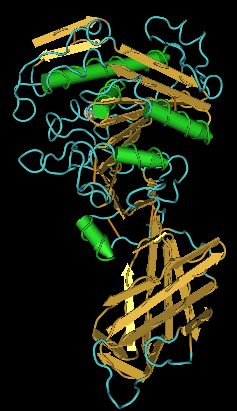
In biochemistry, lipase refers to a class of enzymes that catalyzes the hydrolysis of fats. Some lipases display broad substrate scope including esters of cholesterol, phospholipids, and of lipid-soluble vitamins and sphingomyelinases; however, these are usually treated separately from "conventional" lipases. Unlike esterases, which function in water, lipases "are activated only when adsorbed to an oil–water interface". Lipases perform essential roles in digestion, transport and processing of dietary lipids in most, if not all, organisms.

JoAnne Stubbe is an American chemist best known for her work on ribonucleotide reductases, for which she was awarded the National Medal of Science in 2009. In 2017, she retired as a Professor of Chemistry and Biology at the Massachusetts Institute of Technology.
Mary Ellen Jones was an American biochemist. She was notable for discovery of carbamoyl phosphate, a chemical substance that is key to the biosynthesis of arginine and urea, and for the biosynthesis of pyrimidine nucleotides. Jones became the first woman to hold a chair at the University of North Carolina at Chapel Hill, and the first woman to become a department chair at the medical school. She was a member of the National Academy of Sciences. She was also president of the Association of Medical School Departments of Biochemistry, president of the American Society for Biochemistry and Molecular Biology, and president of the American Association of University Professors. The New York Times called her a "crucial researcher on DNA" and said that her studies laid the foundation for basic cancer research. She died of cancer on August 23, 1996.

Gideon John Davies is a professor of chemistry in the Structural Biology Laboratory (YSBL) at the University of York, UK. Davies is best known for his ground-breaking studies into carbohydrate-active enzymes, notably analysing the conformational and mechanistic basis for catalysis and applying this for societal benefit. In 2016 Davies was appointed the Royal Society Ken Murray Research Professor at the University of York. Gideon Davies has recently been elected to the Council of the Royal Society.
Allen Taylor is an American scientist and Professor of Nutrition, Development, Molecular and Chemical Biology, and Ophthalmology at Tufts University. He focuses on the intersection of proteostasis, nutrition, and aging, specifically age related eye diseases such as age-related macular degeneration and cataract. Recent advances indicate that there is an association between consuming higher glycemic index diets, typical of Western diet patterns and increased risk for age related macular degeneration. The Taylor group seeks to define mechanistic convergence points between these disciplines as well as define why cardiovascular disease and diabetes are also related to similar risk factors. They are investigating if specific drugs can be used to obtain benefits similar to those achieved when people consume lower glycemia diets. After his experience as a Senior Fulbright Scholar in Israel, Dr. Taylor founded and codirects the Science Training Encouraging Peace -Graduate Training Program (STEP), which pairs Israeli and Palestinian advanced level health science students in the same graduate training program in an effort to foster sustainable, cooperative relationships that advance the careers of the STEP Fellows, enrich their academic departments and universities, and provide improved health care or start new industries in the communities they serve. Thus, STEP endeavors to build bridges for productive and cooperative living between the Israeli and Palestinian STEP Fellows and the communities.

Oscar Paul Kuipers is a Dutch professor of molecular genetics at the University of Groningen. His areas of expertise include microbiology, biochemistry, molecular and cell biology, and biotechnology.

Nigel Shaun Scrutton is a British biochemist and biotechnology innovator known for his work on enzyme catalysis, biophysics and synthetic biology. He is Director of the UK Future Biomanufacturing Research Hub, Director of the Fine and Speciality Chemicals Synthetic Biology Research Centre (SYNBIOCHEM), and Co-founder, Director and Chief Scientific Officer of the 'fuels-from-biology' company C3 Biotechnologies Ltd. He is Professor of Enzymology and Biophysical Chemistry in the Department of Chemistry at the University of Manchester. He is former Director of the Manchester Institute of Biotechnology (MIB).
Kenichi Yokoyama is an enzymologist, chemical biologist, and natural product biochemist originally from Tokyo, Japan. He is an Associate Professor of Biochemistry at Duke University School of Medicine. In 2019, Yokoyama was awarded the Pfizer Award in Enzyme Chemistry from the American Chemical Society.
James Allen Wells is a Professor of Pharmaceutical Chemistry and Cellular & Molecular Pharmacology at the University of California, San Francisco (UCSF) and a member of the National Academy of Sciences. He received his B.A. degrees in biochemistry and psychology from University of California, Berkeley in 1973 and a PhD in biochemistry from Washington State University with Ralph Yount, PhD in 1979. He completed his postdoctoral studies at Stanford University School of Medicine with George Stark in 1982. He is a pioneer in protein engineering, phage display, fragment-based lead discovery, cellular apoptosis, and the cell surface proteome.
